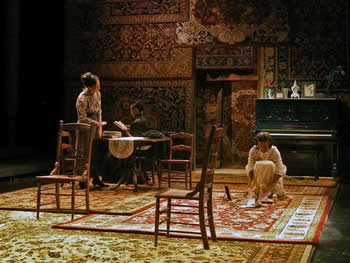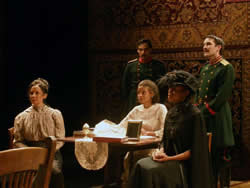
Best Supporting Roles
By Loren Edelson
Three Sisters
By Anton Chekhov
The Gatehouse
150 Convent Ave. (at W. 135th St.)
Box office: (212) 281-9240
Some years ago when I was translating The
Three Hagi Sisters (Hagi-ke no san shimai), Nagai
Ai’s witty adaptation of Three Sisters, into English
from the Japanese, I asked the playwright why she had been inspired
to work with Chekhov’s text. Among her reasons for wanting to
transpose Three Sisters to a completely different place
(rural Japan) and time (turn of the twenty-first century) was
that she believed the supporting characters were in fact better
developed than the sisters, which, in her mind, was a disappointment
and therefore served as a catalyst to write her “own Chekhov play.”
I admit that at the time that particular comment took a backseat
to the more pressing concerns I faced concerning the nuances of
words, oblique references to Japanese commercials, and the pronunciation
of a character’s name.
Ms. Nagai’s comment, however, came back
to me as I was watching Harlem Stage and the Classical Theatre
of Harlem’s co-production of Three Sisters now playing
at the beautifully renovated Harlem Stage Gatehouse, adjacent
to City College. This is a production where several of the so-called
supporting characters take center stage, making it less about
the sisters than about their relatives, friends, and acquaintances
who cause them so much stress and suffering. It might be true,
as The New Yorker asserts, that The Cherry Orchard
(in rotating repertory at BAM), with its tale of an estate foreclosure,
is “the Chekhov play for the moment,” but by highlighting the
often messy business of family relations, director Christopher
McElroen makes Three Sisters equally fresh and contemporary.
Running the show is not any one of the
sisters, but their despised sister-in-law, Natasha (Daphne Gaines),
who grows more threatening every time she makes an appearance.
While the Prozorov sisters play the entire show in more or less
the same costume--Irina (Carmen Gill) always in white; Masha (Amanda
Mason Warren) in black; and Olga (Sabrina LeBeauf) in a range
of dowdy headmistress dresses--Natasha dons a new outfit just
about every time she waltzes onto the stage, as if in retaliation
for being chided for her “tasteless” sense of style in the first
act. The stage time she actually clocks is not as long as any
one of the other sisters', but as soon as she becomes the wife
of Andrey (Billy Eugene Jones) she makes it clear that she is
in charge. In this production, the Prozorov family unravels because
of the desultory effect that Natasha has on every individual who
resides in or visits the country house.
While she manages to wear down just about
every character, Natasha’s hot-tempered selfishness hits Andrey
hardest. He never quite measures up to the high bar that his adoring
sisters set for him. They expect he will become a famous professor,
but there is something amiss when he never actually plays his
violin, but passes it to the maid (Lisa Helmi Johanson) for her
own use; from the start, he is something of a fraud. But the effect
that Natasha has on him is toxic. This becomes painfully clear
in the second act when she kisses and caresses him, unbuttoning
his shirt at the same moment she orders him to cancel the masqueraders,
an annual tradition at the family house, and telling him that
she plans to turn Irina’s room into a nursery for their baby.
Instead of continuing with the foreplay, she stops dead-cold after
delivering her plans. Her ruthless behavior foreshadows her affair
with the chairman of the county council, Protopopov, her sharp
confrontations with the sisters,! and her contemptuous treatment
of the family’s long-time servants.
 By
the end of the play, Andrey, of course, has abandoned any ambitions
of scholarship to take a position with the county council, a serious
sell-out in the eyes of the sisters. While Natasha is the one
who talks excessively about their children, it is Andrey who is
left to push the baby carriage. While a dad taking his baby out
for a stroll is hardly eyebrow-raising today, in the world of
the play, such a seemingly benign gesture appears to be the ultimate
act of emasculation on the part of Natasha.
By
the end of the play, Andrey, of course, has abandoned any ambitions
of scholarship to take a position with the county council, a serious
sell-out in the eyes of the sisters. While Natasha is the one
who talks excessively about their children, it is Andrey who is
left to push the baby carriage. While a dad taking his baby out
for a stroll is hardly eyebrow-raising today, in the world of
the play, such a seemingly benign gesture appears to be the ultimate
act of emasculation on the part of Natasha.
The other supporting character who breathes
fresh life into the play is Kulygin (Jonathan Peck). Although
he is an incorrigible bore to Masha, his wife, he comes across
to the audience as rather charming; there is a playful quality
about him that lightens the sisters’ moodiness. At times, he is
downright funny, such as when he hops into bed and hides under
the covers in order to avoid a run-in with the drunken Chebutykin
(Reg E. Cathey). While he senses that all is not well with his
wife—she is after all carrying on an affair with Vershinin (Roger
Guenveur Smith)—he truly appears to love her, and when he witnesses
her parting, adulterous kiss to the colonel, he looks on not with
hate or envy, but with utter dejection, making his position even
more heartfelt.
So much of the play’s dialogue focuses
on unrealized dreams—what life will be like in years to come,
whether the sisters will ever return to Moscow, will they find
satisfying work, fulfilling love. Somehow the sisters believe
that they will be able to escape their unhappy, provincial life,
but their disillusionment is as thick as the oriental carpets
that cover both the floors and walls of the stultifying set. Only
in the last act are the floor carpets rolled up, providing a momentary
glimmer that some relief might in fact be in store for the tormented
sisters. But with the news that Irina’s fiancé, Baron Tuzenbach
(Joshua Tyson), has been killed in a duel, the sisters—and their
motley crew of relatives, friends, and sponges—are propelled right
back to where they started.
